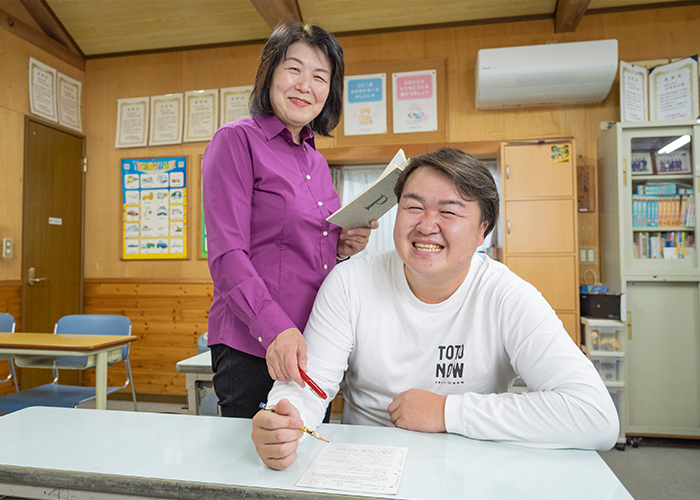The English language skills I developed through the Kumon Method have led me to my current work.
— You are a business owner at the young age of 28. Can you start by telling us what you do and how you started your business?
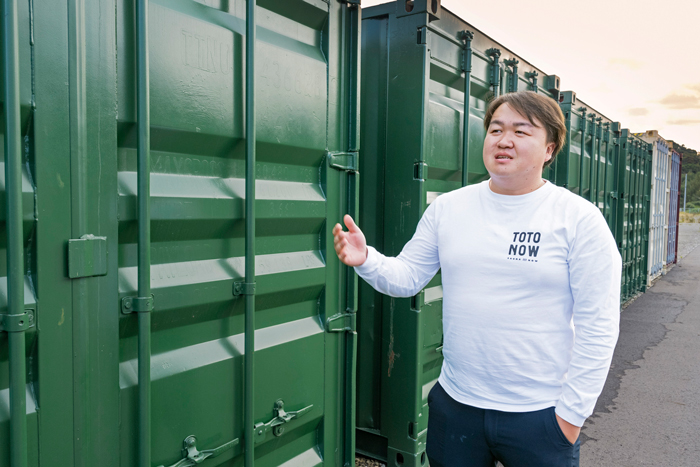
Uno Enterprise Corporation, which I started in 2023 at the age of 27, is a general logistics company based in my hometown of Kashima City, Ibaraki Prefecture. We undertake the accumulation and storage of containers in our 3,000 tsubo (approx. 9,900 sqm) container yard, as well as the arrangement and rental of the containers themselves. We also provide import/export agency services and domestic transportation arrangements.
Our main customers are major exhibition organizers and overseas offshore wind turbine manufacturers. For the former, we handle customs clearance and domestic and international transportation arrangements for products and other items for customers exhibiting at trade shows. The latter is a company involved in the construction of an offshore wind power generation facility that is being developed off the coast of Kashima. Dozens of wind turbines are to be constructed offshore, and construction materials are being transported by ship from overseas wind turbine manufacturers. We temporarily take custody of these containers and rent them out as space for inspections to ensure that they meet Japanese safety standards.
What prompted me to start such a company in my hometown of Kashima was a job as an interpreter, making use of my strong English language skills. I was asked to interpret for an engineer coming to Japan from overseas to work on an offshore wind power project. It was there that I first learned about the container yard business, and I was inspired by the potential of Kashima, which has the Port of Kashima, is close to Narita Airport, and has inexpensive land prices.
Looking back, I see that the English skills I have cultivated through the Kumon Method since childhood have led me to my current job. And even now, I feel that my English skills are useful for smooth communication with overseas customers.
— When did you start learning English?
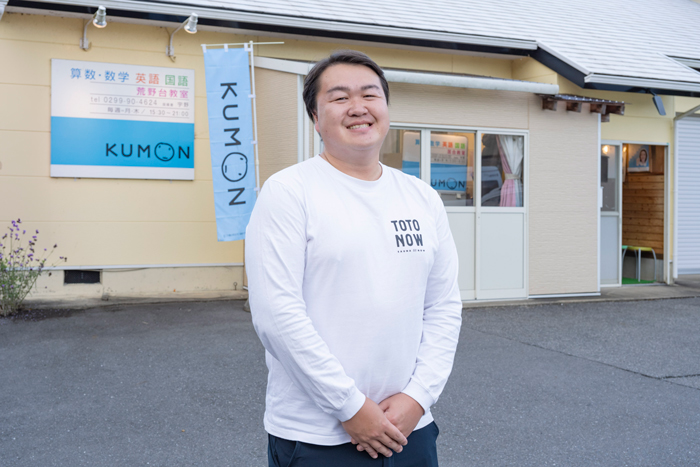
My own Kumon history began when I was in the womb, as my mother has been a Kumon instructor in Kashima City for the past 37 years. That means that I have been listening to my mother and everyone else in the classroom reading English texts since I was in my mother’s belly.
I remember being in the classroom as long as I can remember and working on reading and movement materials zunzun. At that time, my mother was running two KUMON classrooms for four days a week, so Kumon materials were around us as a matter of course. The English materials in particular were quite advanced, and I even passed the Eiken level 2 test in the 6th grade.
Adults I met at EIC who can communicate as equals.
— How did you get involved with the EIC?
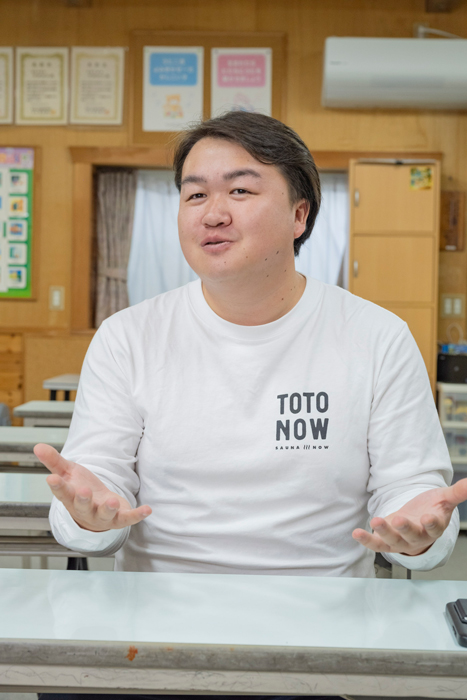
I received a brochure in the classroom and my mother told me that I should experience an English immersion environment without cell phones or anything else.
Up until then, I had traveled abroad and had opportunities to meet people from other countries related to my father’s work, but always with my parents. It was not survival, but I thought I should jump into EIC to create a situation where I had to live using English on my own. That was when I was in 6th grade. I have always been an outgoing person, so once I decided to go, I was very excited and wondered what kind of people I would meet and what kind of kids I would make friends with.
— What kind of encounters did you actually have at EIC?
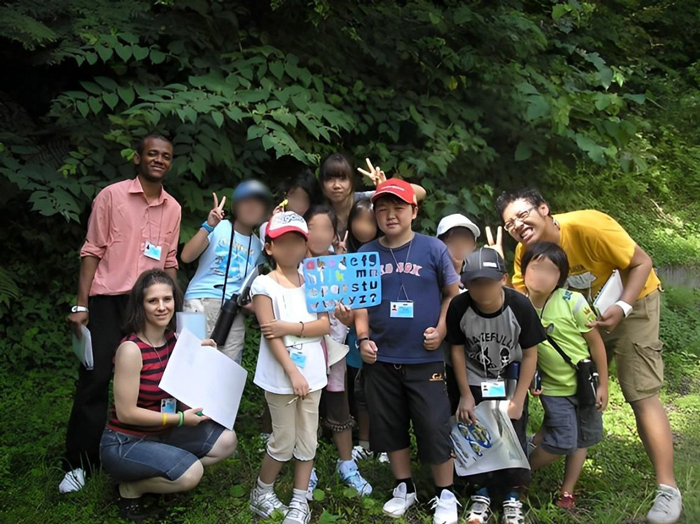
There were many encounters that made me happy, like meeting such interesting adults in the world! The staff were Kumon employees, and the camp leaders were university students from Singapore, Sri Lanka, and around the world who had studied at Ritsumeikan Asia Pacific University (APU), but I would say that they all made noise and excitement with the children from the same perspective. EIC was the first time for me to meet adults who were overjoyed with the children when they achieved something and who could communicate with them on an equal level. That was really exciting and fresh, and I remember feeling strongly at that time that I wanted to be this kind of adult.
After attending a private junior and senior high school, I wondered where I could go to college to become an adult like the ones I met in the EIC. When I thought about it, I was again interested in APU, which had sent many camp leaders to EIC.
I continued to correspond with the camp leaders at the time, so I began visiting them at the APU campus in Beppu, Oita Prefecture. I met them on campus and heard them speak at lectures given by EIC alumni, and I really felt that they were interesting people and that I would enjoy an environment where people like them could learn, EIC was such a great opportunity for me and without EIC, I wouldn’t be where I am today.
— What was particularly memorable about your experience at EIC?
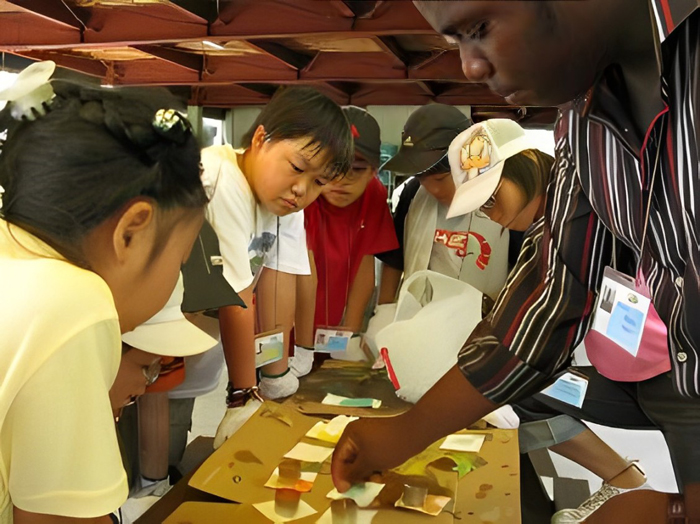
The program was packed from morning to night, and it was truly a fulfilling experience. It was so much fun that a day seemed to fly by, and from the first day I kept thinking, “I wish this environment would never end.
There were activities prepared for everyone, such as making original T-shirts together, drawing pictures of their dreams, and other activities that kept them as busy as working adults, but the most memorable of all was the birthday party where everyone celebrated the participant’s birthday together. Since the culture of celebrating birthdays together was not so common in Japan, it was very interesting and memorable that everyone gathered in a large hall to celebrate in a dance party-like fashion.
The experience of working together with other children of the same age who I had never met before to complete a goal was also very meaningful. There are moments when you want to speak English, but the words don’t come out. At such moments, it is important to ask adults such as camp leaders, but as the children who participated in the program taught each other the words they knew in order to master the tool of English, I felt that the conversations were connected and their vocabularies were growing.
When I was having trouble coming up with the right words, I was encouraged by the children around me who were also in the same state of mind and were taking on challenges. The motto “Don’t be afraid of making mistakes.” is still the core or philosophy of my life. It was a wonderful environment where we could all work together to improve ourselves, so much so that if there was an EIC for working adults, I would want to attend!
Creating a company that is rooted in the community and loved by the community.
— Tell us about your memories of the Kumon Method and your relationship with your mother, who is also your instructor.
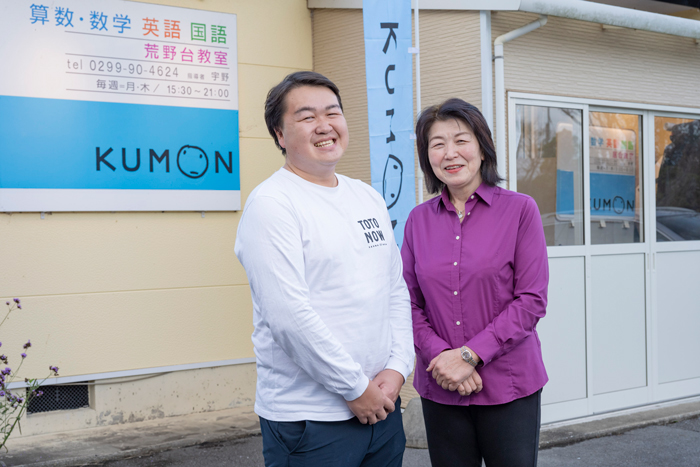
I started studying Kumon when I was 9 months old and continued until high school. In particular, I completed the English course up to the research course. I think it is interesting that Kumon’s English materials mainly consist of sentences from various genres, so I can go through the materials as if I were reading a book.
While school textbooks are based on grammar and syntax, Kumon’s English is not only a novel, but also the diary of Anne Frank, a story based on the historical facts of the Crimean War, a story about the atomic bombing, and other materials that intrigued me and made me want to read the rest of the story in the original text. The appeal of Kumon was that it was based on the history of the Crimean War, the atomic bombing, etc. And when I told this story to Mr. Takeshi Kumon (the eldest son of the founder and former president of Kumon) when I met him, I remember that he said to me, “You really like Kumon’s materials.
In mathematics, I have come to love simultaneous equations thanks to Kumon’s teaching materials. My mother is my instructor and knows how to use Kumon’s materials very well, so for example, when I was stumped by a problem I couldn’t solve or didn’t understand in math, she would take out the materials for simultaneous equations and put me in a good mood. When I got stuck on Japanese materials, she would give me recommended Japanese books.
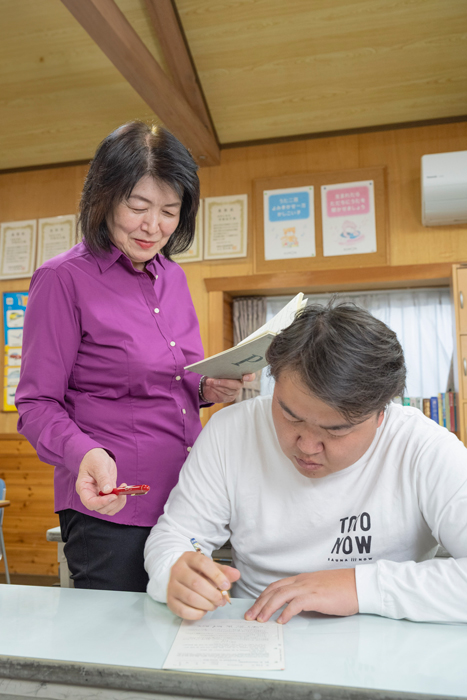
As for my parents, they always had my back without denying me when I wanted to challenge myself in something, and I think that had a great influence on my life. apu was the place I went to after meeting someone at EIC, but I was able to achieve my goal of expanding my network and was invited by an acquaintance to start a start-up company. I was invited to start up a start-up company by an acquaintance, and I actually dropped out. Even at that time, my mother did not oppose me. I think it was because she understood my character of only doing what I wanted to do, and I was grateful.
Now that I am a business owner myself, I feel that my mother and I are more like business associates than a parent-child relationship. My mother is both a Kumon teacher and a sole proprietor who runs a KUMON classroom, so we give each other advice and support.
And I have seen how she has continued to do what is essential to the community, which is education, for many years, and this has had a great influence on me. In fact, I am also a volunteer instructor at a rehabilitation facility that supports recovery from drug addiction and alcoholism, where I teach students using Kumon drills, and because I have seen my mother teach, I believe I could say without hesitation, “I will do it! I believe that it is because I have seen my mother teach that I was able to say “I’ll do it!
— What are your goals for the future?
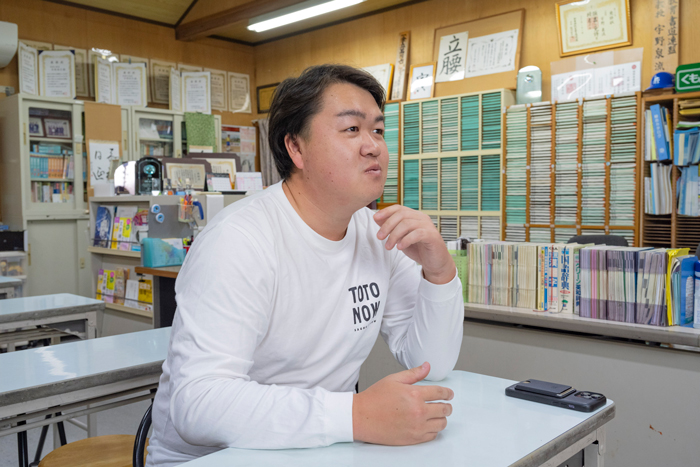
I have a big goal of taking the company public by the age of 35. I want to make Uno Enterprises a company that the people who are involved in our current work and our business partners are happy to have. We want to be a company that is rooted in the community and loved by the community, and we will continue to make contributions to the community without fail.
In my personal life, I hope to get married and have children. In the process of getting listed, you have to keep reaching small goals, but I’m also a little afraid that once you’ve achieved that goal, you’ll be left wondering “what next?”.
I believe it is important to develop the company into one that is loved by the community and that one’s own children would want to take over. I want to create something that will be cherished by the community, just like our parents’ Kumon classes.
— What is your message to the children who study at Kumon?
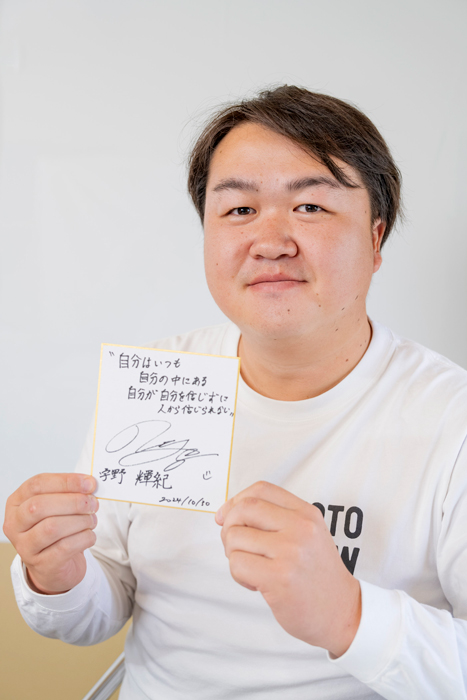
“Don’t be afraid of mistakes!”, I would say to finish what you decide to do and don’t finish it halfway. Even if you fail, if it is a failure because you finish what you set out to do, I think that is the basis for success. If you give up halfway through, it will just end up as a setback.
I felt frustrated because there were students at EIC who could speak English better than I could, and I wondered why I could not do so well, but I did not break down at that point and made efforts to make up for what I lacked. I had to look at everything positively and think about what I lacked in order to solve the next problem, otherwise I would not be able to grow as a person. So, it really comes down to this: “Don’t be afraid of mistakes!”
Kumon English Immersion Activities (kumon-eia.com) What is Global Immersion Camp (GIC)?
Kumon Global Immersion Camp GIC (English Camp) | Kumon English Immersion Activities (kumon-eia.com) Global Immersion Camp (GIC) 2024
Global Immersion Camp 2024 Completion Report|KUMON now! Topics Rules for Notation of Links to Past Articles English Immersion Camp 15th Anniversary Event|KUMON now! TopicsUno Enterprise Co., Ltd 茨城県鹿嶋市のコンテナならウーノエンタープライズ株式会社 | 安心価格 (uuunoenterprise-lp.com)

